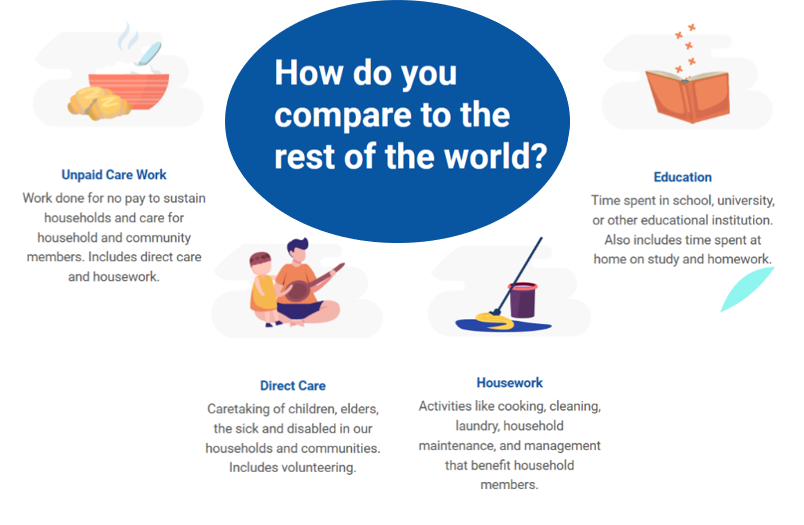New Data from CWW in West Africa for 2022!
To ring in the New Year, Counting Women’s Work has released estimates from four additional member countries for a total of ten countries.
Counting Women’s Work has released estimates from four more countries, plus a second set of Senegal estimates for an additional year. The other countries are Togo, Côte d'Ivoire, Niger, and Mali. The previously released countries are included with the new releases in a complete datafile. Please go to https://www.countingwomenswork.org/data to get the new and improved file.
The new unpaid care work estimates from West Africa are all based on an experimental, condensed time use diary that was included in each country’s Harmonized Survey on Households Living Standards in 2018 (Enquête Harmonisée sur le Conditions de Vie des Ménages, or EHCVM).
We hope to release more countries in 2023.
Unpaid care work and Covid19 - TAKE THE SURVEY
Take Counting Women’s Work’s survey on Unpaid Care Work and Covid19.
The front door is an important border in the gendered economy. A “traditional” division of labor since industrialization is men working outside the home at market work and women inside the home doing unpaid care and housework. In reality, men and women do both types of work, but in every country for which Counting Women’s Work has estimates, on average men do more market work than women and women do more unpaid care work than men. Will this persist in the face of massive dislocations caused by the coronavirus pandemic? We do not know.
Shelter in place, social distancing, lockdown. Whatever it is called in your area, government orders to slow the spread of the coronavirus have upended daily life for billions. Most of us are being asked to retreat to our households. Will we see the gendered economy differently when it no longer hides behind a door?
Counting Women’s Work has developed a survey to study how paid and unpaid work has changed in this new era. We invite you to take the survey, then share it with family, friends, and colleagues. It gives respondents the chance to be heard about how their household is coping with all kinds of work changes:
Have you or your spouse or partner lost paid employment? Or is your work considered “essential” and you are working longer hours than ever? Would you rather stay home but cannot afford to go without a paycheck?
Are you spending more hours on childcare in the face of school and childcare closures?
Are you doing tasks that you used to purchase from restaurants, housecleaners, or other service providers?
Is the work in your household being shared more evenly or less?
What do YOU want to say about work in and out of the household in this new, uncertain time?
The survey is anonymous and participation voluntary. We will publish preliminary results here once 500 responses have been gathered and will continue to update results as the sample size grows. The survey is in English, but CWW would be happy to have collaborators translate the survey instrument and use it in other countries. Feel free to leave comments or questions below, or contact Gretchen Donehower, the Principal Investigator of Counting Women’s Work.
On International Women's Day, count your care with CWW's new web app!
On International Women’s Day 2020, make care work count by counting all work. CWW’s online data app allows users to compare the time they spend in housework, household management, and care for others with care producers around the world.
On International Women’s Day, we reflect on how far the world has come in giving women and girls equal opportunities and how far we still have to go. We have made great strides toward gender equality in primary education, property rights, protection under the law, and access to labor markets. Large gender gaps still exist in wages, political representation, wealth, and enforcement of laws on gender equality. One factor behind some of these gaps may be unequal responsibility for unpaid care work.
Counting Women’s Work data shows us how large those gaps are and how they differ by age, country, and region. Click the button below to try our new online app and see how much time YOU spend in unpaid care work compared to people around the world.
While you are counting your work, let’s think about what it means. Is this work valuable? Is it valued? Are we satisfied with how the drudgery and joy is shared by women and men, governments and private markets? The more we count ALL of our work, the more our work counts.
Happy New Year Data from CWW, January, 2020!
To ring in the New Year, Counting Women’s Work has released estimates from four additional member countries for a total of ten countries.
To ring in the New Year, Counting Women’s Work has released estimates from four more countries: Mexico, India, Vietnam, and Mauritius. The six previously released countries (Colombia, Ghana, Senegal, South Africa, United States, and Uruguay) are included with the new releases in a complete ten-country datafile. Please go to https://www.countingwomenswork.org/data to get the new and improved file.
We hope to release more countries in the coming months.
Categories
Tags
- Africa 3
- Asia 3
- Audio 2
- Brazil 1
- Burkina Faso 2
- Colombia 10
- Costa Rica 10
- Covid19 2
- Cross-country 19
- El Salvador 1
- Europe 5
- Example Code 1
- Fertility 2
- Gender Dividends 3
- Ghana 4
- Hispanic ethnicity 1
- Human Capital 1
- Hungary 1
- India 3
- Kenya 2
- Latin America 7
- Mauritius 2
- Methodology 6
- Mexico 4
- Policy-related 10
- Senegal 5
- Slides 10
- Slovenia 1
- South Africa 9
- South Korea 2
- Spain 2
- Spanish language 4
- Turkey 1
- United States 3
- Uruguay 2
- Video 7
- Vietnam 4
- Web Conference 4








